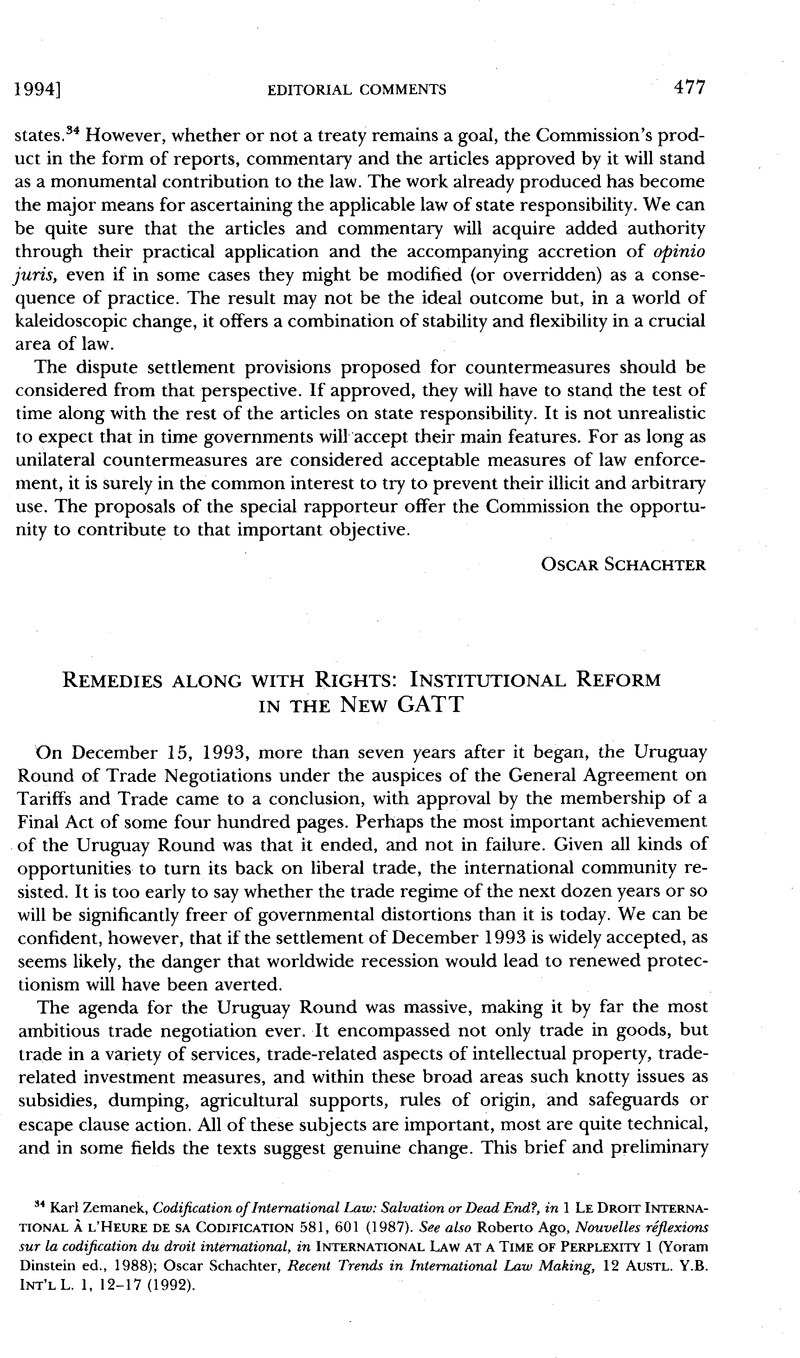Published online by Cambridge University Press: 27 February 2017

1 Throughout the Uruguay Round, the proposed new organization was referred to as Multilateral Trade Organization or MTO, apparently because of resistance by the United States to the word “world” in the title. At the last moment “world” triumphed and “multilateral,” which sounded too technical and even technocratic, was abandoned.
2 For instance, in return for a more explicit prohibition of export subsidies, the United States agreed to introduce a finding of injury to a domestic industry as a condition for imposition of countervailing duties against subsidized imports. But this significant amendment to U.S. trade law was made applicable only with respect to imports from countries that had adhered to the Subsidies Code or (like Mexico) had entered into an equivalent agreement with the United States. Compare 19 U.S.C. §1671(a) and (b) with 19 U.S.C. §1303 (1988).
3 Agreement Establishing the World Trade Organization, pt. II of Final Act Embodying the Results of the Uruguay Round of Multilateral Trade Negotiations [hereafter Final Act], GATT Doc. MTN/FA (Dec. 15, 1993), reprinted in 33 ILM 1, 13 (1994).
4 Id., pt. II, Ann. 2, 33 ILM at 112.
5 In some circumstances, it is also possible for a state to bring a nonviolation complaint, alleging impairment of rights of the complaining state even if the respondent has not acted in breach of a rule of GATT, but has frustrated the reasonable expectation of the complaining state. See, e.g., Robert Hudec, Enforcing International Trade Law 237–48 (1993).
6 See, for instance, the Canned Fruit case, a complaint by the United States against the European Community program of subsidizing domestic producers, with the subsidy based on the selling price of competing imported products. The dispute, described in detail in Hudec, note 5 supra, at 155–57, was initiated by U.S. peach producers in October 1981. The United States opened intergovernmental discussions in December 1981, a panel was established in June 1982, and the panel circulated a report, generally favorable to the U.S. position, in November 1983. Thereafter, the panel report was twice revised upon demand of the EC for reconsideration, and finally delivered to the parties again in July 1984. The report was debated during most of 1985, but the European Community refused to permit adoption of the report, and the United States eventually agreed to withdraw the report from the agenda of the GATT Council in exchange for agreement by the EC to reduce the subsidy and to limit the quantity of goods subsidized. Other instances involved the United States v. the EC on Citrus, South Africa v. Canada on Gold Coins, and the EC v. the United States on Wine and Grape Products. In each case the panel report came out in favor of the complaining party, and the respondent party blocked adoption of the report. In several of these cases the parties eventually reached a settlement, but the legal processes of the GATT were clearly frustrated. See id. at 201–03.
7 In 1988 the United States first threatened and then imposed sanctions against imports from Brazil under §301 of the Trade Act of 1974 as amended, on the ground that that country had failed to afford patent protection for pharmaceuticals owned by U.S. firms. 53 Fed. Reg. 28,177 (1988) (President’s determination of “unreasonable measures”); id. at 41,551 (proclamation of 100% duties on more than 20 products from Brazil). Brazil contended, with reason, that the sanctions were illegal under GATT, and that there was no international requirement that states must afford patent protection to pharmaceuticals. Brazil initiated a complaint proceeding in GATT in August 1988, but the United States blocked appointment of a panel for half a year, backing down only after more than 60 countries expressed their support for the request for a panel. 6 Int’l Trade Rep. (BNA) 171 (Feb. 8, 1989); id. at 238 (Feb. 22, 1989). Disagreement about the composition of the panel and its terms of reference delayed its actual establishment until September 1989. In July 1990, the United States lifted the sanctions, on the basis of an undertaking by the new President of Brazil to seek legislation that would grant patent protection to pharmaceutical products. 55 Fed. Reg. 27,324 (1990). Thereafter, Brazil withdrew its complaint and no ruling was ever issued in the case.
8 The quoted phrase comes from Aggressive Unilateralism: America’S 301 Trade Policy and the World Trading System (Jagdish Bhagwati & Hugh Patrick eds., 1990).
9 The current U.S. Trade Representative, Mickey Kantor, told a news conference on December 20, 1993, that “the ability of the United States to keep its industries competitive will be unaffected by the World Trade Organization with regard to Section 301.” 11 IntT Trade Rep. (BNA) 30 (Jan. 5, 1994). The report of the news conference states, however, that Mr. Kantor conceded that the United States will have to take cases under §301 to GATT for dispute resolution more often than it did in the past because the WTO will cover more areas.
10 European Community/United States: United States Section 337 of the Tariff Act of 1930, GATT, Basic Instruments and Selected Documents, 36th Supp. 345 (adopted Nov. 7, 1989).
11 See, e.g., Pierre Pescatore, The GATT Dispute Settlement Mechanism: Its Present Situation and Its Prospects, 10 J. Int’l Arb. 27 (1993).
12 Agreement on Implementation of Article VI of GATT 94, Art. 17, Final Act, supra note 3, pt. II, Ann. 1A–8.
13 I am speaking, of course, of participation by GATT professionals in drafting the report, not of secretarial functions such as reproducing documents, arranging travel, etc.
14 Unlike a retaliatory measure taken by the prevailing party, as discussed below, a concession by way of compensation by the offending party would, it seems clear, have to be granted on an MFN basis, because it would not fit into any of the permitted exceptions to that fundamental principle of GATT. The Understanding on Dispute Settlement does not address this point.
15 Hudec, note 5 supra, at 358.